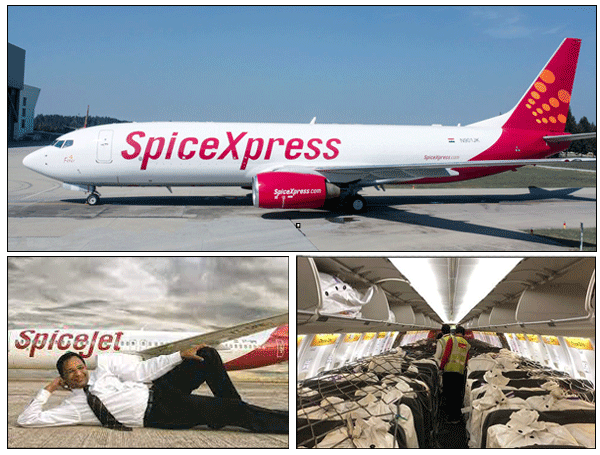|
Indian aviation is passing through its most
difficult phase.
In a financial crunch even before the pandemic
started, with the second run of Covid this time around, the aviation sector
is predicted to see possible downsizing or as Reuters put it, “have
their planes repossessed by lessors as a surge of COVID-19 infections
roils travel.”
Forwarders Apprehensive
As metro cities Mumbai, Delhi and Bengaluru
go for stringent lockdowns, forwarders are apprehensive.
The lockdowns are certain to impact manufacturing
and push air freight down. To top it all, fewer flights will mean space
constraints and higher rates.
Passenger numbers have been going down steadily.
Ratings agency ICRA pointed out that for April 2021, domestic passenger
traffic has been estimated at around 5.5-5.6 million. That will be a decline
of around 29 percent compared to 7.82 million in March 2021. Simply put,
the domestic passenger traffic will be lower than the October 2020 levels.
 On
the part of the airlines, capacity for April 2021 was lower by around
15 percent compared to March 2021 (around 60,300 departures, against 71,300
departures in March 2021). That shows the declining demand scenario arising
basically from fliers unwilling to risk travel by air due to the rise
in Covid-19 infections. Incidentally, domestic airline operations were
shut down completely during April 2020. On
the part of the airlines, capacity for April 2021 was lower by around
15 percent compared to March 2021 (around 60,300 departures, against 71,300
departures in March 2021). That shows the declining demand scenario arising
basically from fliers unwilling to risk travel by air due to the rise
in Covid-19 infections. Incidentally, domestic airline operations were
shut down completely during April 2020.
Kinjal Shah, (left) Vice President &
Co-Group Head, ICRA said that “the number of flights departing has
also gradually declined from February 2021 onwards, with the average daily
departures close to 2,000 in April 2021, down from 2,300 in March 2021
and February 2021.
“The average number of passengers
per flight during April 2021 was 93, against an average of 109 passengers
per flight in March 2021.”
Capacity Going Up
This despite the fact that the Ministry
of Civil Aviation (MoCA) permitted increasing the capacity gradually from
33 percent, with effect from May 25, 2020, to 80 percent, with effect
from December 3, 2020.
The 80 percent increase continues till May
31, 2021.
The Cash Flow @ IndiGo
In such circumstances, the country's largest
cash-rich carrier (by pax numbers) IndiGo has decided to raise equity
to tide over the crisis.
In a letter informing the National Stock
Exchange of India Limited and the Bombay Stock Exchange, on May 10, 2021,
InterGlobe Aviation (IndiGo's parent company) said that the “Board
of Directors of InterGlobe Aviation Limited … approved the raising
of funds for an aggregate amount not exceeding INR 3,000 Crores (Indian
Rupees Three Thousand Crores/USD$450.941 million) through an issue of
equity shares…”
Incidentally, the move came barely months
after IndiGo's parent Interglobe Aviation discarded plans to raise up
to $543 million in January this year when the situation was better and
a faster recovery in air travel was seen.
PAX Numbers Tanking
With passenger numbers decreasing every
day, Reuters quoting an analyst said that “cash burn is expected
to rise to $3.4 million a day, a level last seen in September from $2
million a day at the end of 2020.”
IndiGo will be able to weather the turbulence
but it is the smaller carriers that will be most affected. With little
or no government assistance, the smaller carriers would need help. And
with deaths all around, fewer jobs and incomes coming down, the comeback
to domestic travel will be delayed, in fact, according to analysts, not
till the first quarter of 2022.
International India Flights At Nil
Worse still is the fact that there is hardly
any international travel.
Almost all nations have stopped Indians from flying in. The charter flights
that operated in the air bubbles, including to the UK and U.S. too have
been stopped. These charters provided revenues to smaller domestic carriers
like SpiceJet and others. International traffic will be expected to reach
pre-COVID levels only by 2024, according to CAPA.
Underworld CarGo at Indigo
What then about cargo?
IndiGo that referred recently to its cargo
activity below deck, as life in the ‘underworld’ is keen to
ramp up its cargo operations.
 As
CEO Ronojoy Dutta pointed out some time ago, “CarGo (that is IndiGo's
cargo division) has been a success story over the past year, creating
new records, but our belief in the cargo business goes beyond the special
circumstances right now.” As
CEO Ronojoy Dutta pointed out some time ago, “CarGo (that is IndiGo's
cargo division) has been a success story over the past year, creating
new records, but our belief in the cargo business goes beyond the special
circumstances right now.”
Recently, the carrier signed a letter of intent for two A321 passenger-to-freighter
conversions and is looking out for two more planes.
These aircraft, the first to come online
by June 2022 will join IndiGo's fleet of more than 280 aircraft.
Because of COVID-19, the affect on air cargo
is being felt with international airlines stopping flights from and to
India.
With fewer passengers, domestic routes would
also see fewer flights.
The reduction in belly space for cargo due
to fewer passenger flights is having an impact.
Can the cargo-in-cabin flights make it up?
 |
SpiceJet Discovers Cargo
SpiceJet, which has ramped up its cargo
services in the last year-and-a-half, said that it has done well as far
as passenger and cargo services are concerned and that it had enough cash
to keep flying. The cargo division SpiceXpress has 19 cargo aircraft,
including five widebodies. Even so, it has started meeting investors for
further capitalization. There are reports too that SpiceJet expected compensation
from Boeing for the 737-MAX aircraft it was supposed to receive.
In such a situation, if lessors demand to
be paid on time and are adamant about not writing off debts, the smaller
carriers in India would have a very tough time.
TG |








